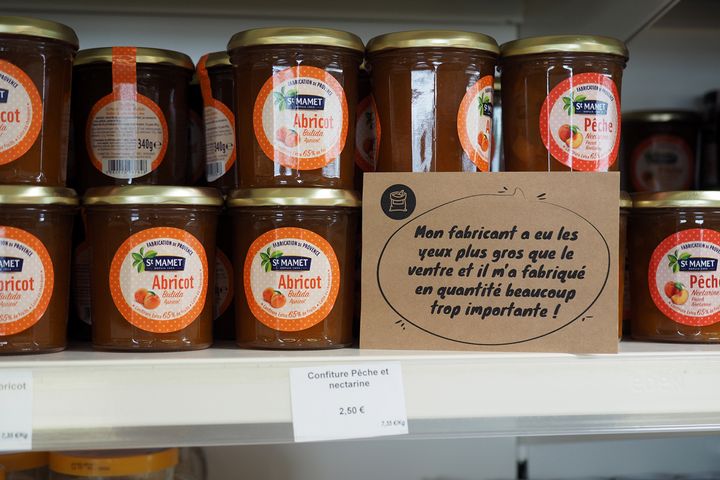 Grocery Stores Against Food Waste
Grocery Stores Against Food WasteAn anti-waste grocery store network is taking off in France, selling "unsellable" products at discount prices.
Oddly-shaped cucumbers, yoghurts nearing their expiry date, slightly dented cookie packages — that's what the customers of Nous Épiceries Anti-Gaspi ("We, Anti-Waste Grocery Stores") can expect to find in the new brand's shops in Brittany, France. Unlike other stores, they actively fight food waste by selling products that would otherwise be discarded.
According to the country's Environment and Energy Management Agency (ADEME), the market is huge — in France alone, 10 million tonnes of food are thrown away every year. Industrial producers and manufacturers are responsible for 53 percent of this waste, while distributors and end consumers toss the remaining 47 percent into the trash. Throwing away food that is still edible contributes to overexploitation of natural resources such as water and agricultural land.
Hoping to prevent this squandering of food and resources, French entrepreneurs Charles Lottmann and Vincent Justin have created a chain of grocery stores offering unsold items. The idea was Lottmann's. He had been working for a year at Phénix, a French company fighting food waste with a brand, Les gueulescassées ("Broken Faces"), selling fruit and vegetables with surface imperfections at cut-rate prices in supermarkets. Justin brought his entrepreneurial background to the venture.

The duo put together their savings, along with money from family and friends, then discussed a first financial round with Phénix. The first store opened in May 2018 in Melesse, near Rennes, in Brittany, a northwestern region of France. Following its success, a second grocery store opened last November in Saint Jouan-des-Guérets, near Saint-Malo, on the northern coast of Brittany. Why Brittany? "It is the leading agri-food region in France, with many producers who have becomeour partners. The inhabitants of the region are very aware of sustainable development," explains Lottmann, who is the company's president.
The recipe is simple, he says: "We collect unsold products directly from producers. We now have 200 suppliers, from the small local market producer who delivers his products every two to three days, to a big food manufacturer like Danone. And that number grows every week."
From fruit to vegetables, pantry staples, drinks, frozen foods, fresh meat or fish, and even beauty and hygiene products (end of series, promotions or damaged boxes), "a family of four can buyup to 75 percent of its groceries in these mini-markets," says Lottmann. The selection changes from one week to the next, so consumers must learn to adapt. And though they won't necessarily find the same brands as at a supermarket, the tradeoff might be worth it, since prices at these anti-waste stores are 30 percent lower than for traditional brands. In theory, this allows a family of four to save as much as 200 euros (USD 227) a month, says the company's president.

For now, the contents of a typical shopping cart cost around 25 euros. The average price per product is only one euro, giving consumers a chance to discover the new concept. The number of regular clients has been increasing every day, a mix of bargain hunters and environmentally concerned citizens doing their shopping among wooden pallets as displays, attractively recycled cardboard furniture and second-hand trolleys. On the Facebook page of the Melesse store, a customer named Pierre approves of this "beautiful initiative to fight against the aberration of foodwaste." Aurore thanks the store"for giving consumers the opportunity to buy products that make a difference," and Caroline appreciates that "you can vary your meals, thanks to the different items that arrive."
The store's directors say they are proud to have a positive impact on the environment. Indeed, the 10 million tonnes of food thrown away every year in France represent 15.3 million tonnes of CO2-equivalent. Lottmann says that each grocery store prevents as much as 35 tonnes of food from ending up in the trash every month and 81 tonnes of greenhouse gases from being released into the atmosphere.
"Now that we have proven our concept, we are launching a second round of financing with the same shareholders, in order to move onto our true development phase," he says. Two new stores are opening – one in Rennesat the end of April, and another in Laval, in western France, in June. The company currently has 20 employees but aims to open around 20 stores in the next three years, directly or via franchises. The concept could spread beyond France, as the food waste problem is omnipresent in industrialized countries.
This article isbeingpublished as part of Earth Beats, an international and collaborative initiative gathering 18 news media outletsfromaround the world to focus on solutions to waste and pollution.
